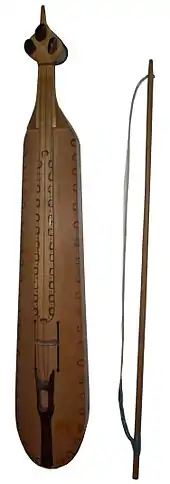Dilli kaval
The dilli kaval (Azerbaijani: Tütək) is a traditional fipple flute from Turkey and Azerbaijan. It is typically made of plum, ebony, or apricot wood. It has seven holes on the front and a thumb hole on the back; the lowest hole on the front is seldom, if ever, covered while playing. Similar to a penny whistle, the register can be controlled by the force of breath. The word "dilli" is Turkish for "tongued" and alludes to the fact that this flute has a duct or "fipple" rather than being rim-blown like a conventional kaval.
 | |
| Classification | |
|---|---|
| Related instruments | |
The soprano dilli kaval in C and the alto version in A are handmade. Both types were patented by Burhan Tarlabaşı. All 12 chromatic tones from Low A to High G# can be played on them.
Custom-made ebony-reed kavals in C# and F#, also designed by Burhan Tarlabaşı, are very rare. Their sound is very crisp and similar to tin whistles, but the wood adds a breathy softness.
See also
External links
- http://atlas.musigi-dunya.az/en/tutek.html
- https://web.archive.org/web/20080827230504/http://www.burhantarlabasi.com/en/indexen.htm
- https://web.archive.org/web/20090305181106/http://www.burhantarlabasi.com/mp3/instrumental.mp3


